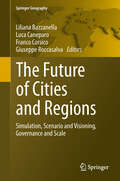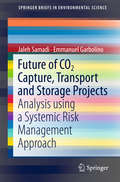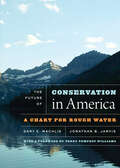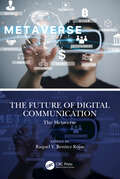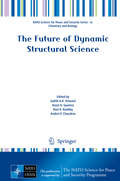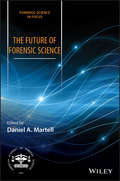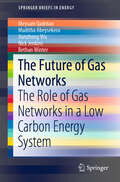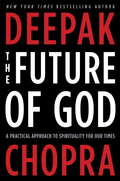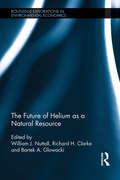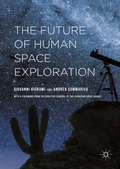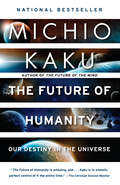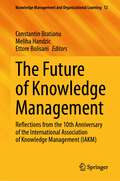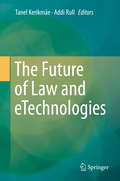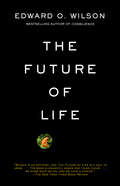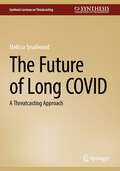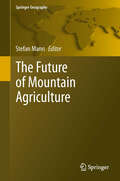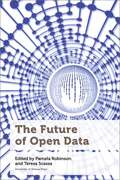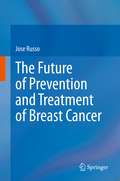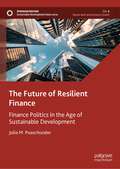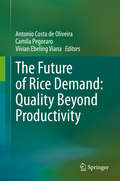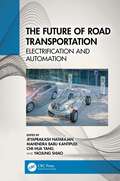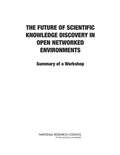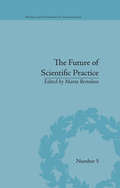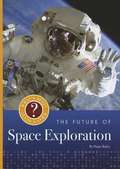- Table View
- List View
The Future of Cities and Regions
by Franco Corsico Giuseppe Roccasalva Liliana Bazzanella Luca CaneparoThis guide for tomorrow's urban practitioner systematically explains fifteen best practices across three continents; it explores questions of broad interest for designing and planning the future of cities and regions. Key questions addressed are: Is simulation useful to explore the effects of different design, policy and planning strategies? Which approach will help manage the uncertainties of metropolitan areas both today and tomorrow ? What are the strengths and weaknesses of the different simulation practices for city leadership, public and private partnership, and citizen involvement? The book reviews computer models and media, socio-political initiatives, professional practices which help communicating the future effects of different design, political and planning strategies with a wide range of aims: from information, through consultation, towards active participation. These world best practices are considered according to four leading issues for urban and regional development, respectively Simulation, Scenario and Visioning, Government and Governance, and Scale. The book examines the approaches adopted technically and procedurally. The selected knowledge and the innovative tools used in each case study are among the most advanced and up-to-date in the professional and research fields. This volume successfully illustrates these innovative practices and methodologies in a straightforward and accessible way.
Future of CO2 Capture, Transport and Storage Projects: Analysis Using A Systemic Risk Management Approach (SpringerBriefs in Environmental Science)
by Jaleh Samadi Emmanuel GarbolinoThis book presents a summary of a three-year research project on risk management for the Capture, Transport and Storage of CO2 (CTSC), offering an in-depth study on complex sociotechnical systems and systemic modeling. Approaching CTSC as a complex sociotechnical system, this book proposes systemic modeling as a decision-making aid. It offers a means of decision-making for the development of CTSC projects in the real-world context, where the future of the technology is uncertain. Risk management is considered as a means of control that can provide a control structure for the whole system.The risks associated with CTSC are not exclusively technical in nature; CTSC also faces a number of further uncertainties, from development to commercial scales.A major question concerning CTSC at the current scale of development is: "What are the factors explaining the success or failure of CTSC projects in different contexts?" In order to answer this question, the book proposes a systemic risk management framework based on the system dynamics and STAMP (Systems-Theoretic Accident Model and Processes) concepts.
The Future of Conservation in America: A Chart For Rough Water, With A Foreword By Terry Tempest Williams
by Terry Tempest Williams Gary E. Machlis Jonathan B. JarvisThis is a turbulent time for the conservation of America’s natural and cultural heritage. From the current assaults on environmental protection to the threats of climate change, biodiversity loss, and disparity of environmental justice, the challenges facing the conservation movement are both immediate and long term. In this time of uncertainty, we need a clear and compelling guide for the future of conservation in America, a declaration to inspire the next generation of conservation leaders. This is that guide—what the authors describe as “a chart for rough water.” Written by the first scientist appointed as science advisor to the director of the National Park Service and the eighteenth director of the National Park Service, this is a candid, passionate, and ultimately hopeful book. The authors describe a unified vision of conservation that binds nature protection, historical preservation, sustainability, public health, civil rights and social justice, and science into common cause—and offer real-world strategies for progress. To be read, pondered, debated, and often revisited, The Future of Conservation in America is destined to be a touchstone for the conservation movement in the decades ahead.
The Future of Digital Communication: The Metaverse
by Raquel V. Benítez RojasThis collection of essays explores the present and future of digital communication through a range of interdisciplinary approaches, all of which focus on the so-called metaverse. The metaverse is a combination of multiple elements of technology – including virtual reality, augmented reality, and video – where users "live" within a digital universe. The vision for this new universe is that its users can work, play, and stay connected with friends through everything. Such a vision is hinted at in existing phenomena such as online game universes.
The Future of Dynamic Structural Science
by Judith A. K. Howard Hazel A. Sparkes Paul R. Raithby Andrei V. ChurakovThis work focuses on complementary crystallographic and spectroscopic areas of dynamic structural science, from papers presented at the 46th NATO sponsored course in Erice, Sicily 2013. These papers cover a range of material from background concepts to more advanced material and represent a fully inter-disciplinary collection of the latest ideas and results within the field. They will appeal to practising or novice crystallographers, both chemical and biological, who wish to learn more about modern spectroscopic methods and convergent advances and hence vice versa for experimental and computational spectroscopists. The chapters refer to the latest techniques, software and results and each chapter is fully referenced. The volume provides an excellent starting point for new comers in the emerging, multi-disciplinary area of time resolved science.
The Future of Forensic Science: Current Research And Practice Leading To Future Opportunities (Forensic Science in Focus)
by Daniel A. Martell Douglas H. UbelakerOffers a diverse, interdisciplinary, and eye-opening view of the future direction of forensic science This one-of-a-kind book is a collection of content from the Past and Current Presidents of the American Academy of Forensic Sciences—providing readers with all of their forensic science experience, knowledge, insight, and wisdom. It envisions where forensic science will be a decade from now and the impact of these emerging advances on the law (along with our place in it), emphasizing theoretical advances, innovative leads from the laboratory, and emerging technologies. Filled with information from some of the greatest forensic minds of their generation, The Future of Forensic Science covers all of the eleven sections that comprise the AAFS. It discusses new directions in forensic anthropology, and looks at the future of such disciplines as criminalistics, forensic engineering science, forensic psychiatry and behavioral science, forensic toxicology, and forensic document examination. It also touches on the current and future state of digital and multimedia sciences. Contains contributions from an eminent group of forensic science experts Presents a valuable repository of forensic science experience, knowledge, insight, and wisdom Offers an insightful interdisciplinary look at the future of forensic science and how it is changing forensic science for the better Timed to coincide with the NIST forensic science initiative and the OSAC process The Future of Forensic Science is a must-have book for practicing forensic science professionals, academics, and advanced undergraduate and graduate students in forensic science. This book is published as part of the AAFS series ‘Forensic Science in Focus’.
The Future of Gas Networks: The Role of Gas Networks in a Low Carbon Energy System (SpringerBriefs in Energy)
by Meysam Qadrdan Muditha Abeysekera Jianzhong Wu Nick Jenkins Bethan WinterThis book investigates the role of gas networks in future low-carbon energy systems, and discusses various decarbonisation pathways, providing insights for gas network operators, developers, and policy makers. As more countries around the world move towards low-carbon energy systems and increase their exploitation of renewable energy sources, the use of natural gas and the associated infrastructure is expected to undergo a substantial transformation. As such there is a great uncertainty regarding the future role of gas networks and how they will be operated in coming years.The topics addressed include:Fundamentals of gas network operationThe impact of variable renewable electricity generation on the operation and expansion of gas networksThe impact of decarbonising heat supplies on gas networksOpportunities and challenges of utilising gas networks to transport alternative low-carbon gases such as bio-methane and hydrogen
The Future of God
by Deepak ChopraFrom the New York Times Bestselling Author. Can God be revived in a skeptical age? What would it take to give people a spiritual life more powerful than anything in the past? Deepak Chopra tackles these issues with eloquence and insight in this book. He proposes that God lies at the source of human awareness. Therefore, any person can find the God within that transforms everyday life. God is in trouble. The rise of the militant atheist movement spearheaded by Richard Dawkins signifies, to many, that the deity is an outmoded myth in the modern world. Deepak Chopra passionately disagrees, seeing the present moment as the perfect time for making spirituality what it really should be: reliable knowledge about higher reality. Outlining a path to God that turns unbelief into the first step of awakening, Deepak shows us that a crisis of faith is like the fire we must pass through on the way to power, truth, and love. "Faith must be saved for everyone's sake," he writes. "From faith springs a passion for the eternal, which is even stronger than love. Many of us have lost that passion or have never known it." In any age, faith is a cry from the heart. God is the higher consciousness that responds to the cry. "By itself, faith can't deliver God, but it does something more timely: It makes God possible." For three decades, Deepak Chopra has inspired millions with his profound writing and teaching. With The Future of God, he invites us on a journey of the spirit, providing a practical path to understanding God and our own place in the universe. Now, is a moment of reinvigoration, he argues. Now is moment of renewal. Now is the future.
The Future of Helium as a Natural Resource (Routledge Explorations In Environmental Economics Ser.)
by William J. Nuttall Richard H. Clarke Bartek A. GlowackiThe book reveals the changing dynamics of the helium industry on both the supply-side and the demand-side. The helium industry has a long-term future and this important gas will have a role to play for many decades to come. Major new users of helium are expected to enter the market, especially in nuclear energy (both fission and fusion). Prices and volumes supplied and expected to rise and this will prompt greater efforts towards the development of new helium sources and helium conservation and recycling.
The Future of Human Space Exploration
by Giovanni Bignami Andrea SommarivaFor several decades it has been widely accepted that human space exploration is the exclusive domain of government agencies. The cost of performing such missions, estimated in multiple reports to amount to hundreds of billions dollars over decades, was far beyond what private entities could afford. That arrangement seems to be changing. Buoyed by the success of its program to develop commercial cargo capabilities to support the International Space Station, NASA is becoming increasingly open to working with the private sector in its human space exploration plans. The new private-public partnership will make 'planet hopping' feasible. This book analyses the move towards planet hopping, which sees human outposts moving across the planetary dimensions, from the Moon to Near-Earth Asteroids and Mars. It critically assesses the intention to exploit space resources and how successful these missions will be for humanity. This insightful and accessible book will be of great interest to scholars and students of space policy and politics, international studies, and science and technology studies.
The Future of Humanity: Terraforming Mars, Interstellar Travel, Immortality, and Our Destiny Beyond Earth
by Michio Kaku<P> The #1 bestselling author of The Future of the Mind traverses the frontiers of astrophysics, artificial intelligence, and technology to offer a stunning vision of man's future in space, from settling Mars to traveling to distant galaxies. <P> Formerly the domain of fiction, moving human civilization to the stars is increasingly becoming a scientific possibility--and a necessity. Whether in the near future due to climate change and the depletion of finite resources, or in the distant future due to catastrophic cosmological events, we must face the reality that humans will one day need to leave planet Earth to survive as a species. <P> World-renowned physicist and futurist Michio Kaku explores in rich, intimate detail the process by which humanity may gradually move away from the planet and develop a sustainable civilization in outer space. He reveals how cutting-edge developments in robotics, nanotechnology, and biotechnology may allow us to terraform and build habitable cities on Mars. He then takes us beyond the solar system to nearby stars, which may soon be reached by nanoships traveling on laser beams at near the speed of light. Finally, he brings us beyond our galaxy, and even beyond our universe, to the possibility of immortality, showing us how humans may someday be able to leave our bodies entirely and laser port to new havens in space. <P>With irrepressible enthusiasm and wonder, Dr. Kaku takes readers on a fascinating journey to a future in which humanity may finally fulfill its long-awaited destiny among the stars. <P><b> A New York Times Bestseller</b>
The Future of Knowledge Management: Reflections from the 10th Anniversary of the International Association of Knowledge Management (IAKM) (Knowledge Management and Organizational Learning #12)
by Constantin Bratianu Meliha Handzic Ettore BolisaniThis edited volume explores the challenges and opportunities of knowledge management (KM) in the post-pandemic world. Intangibles have become dominant resources, and their effective management is key to navigating the complexity of the new business environment. The book is divided into three parts, each focusing on a different aspect of KM: complexity, human factors, and technology.Through 15 chapters by 28 contributors from 18 countries, this collection offers a diverse range of perspectives on the evolution of KM over the past decade and its potential for the future. The contributors analyze topics such as digital transformation, distant reading, knowledge visualization, and advanced KM systems. This volume will be of interest to researchers and practitioners in the field of KM, as well as to anyone interested in the challenges and opportunities facing organizations in the post-pandemic world.This edited volume celebrates the 10th anniversary of the International Association for Knowledge Management, offering an overview of the field's achievements and prospects for innovation and sustainability.
The Future of Law and eTechnologies
by Tanel Kerikmäe Addi RullThis book presents groundbreaking discussions on e-residency,cryptocurrencies, scams, smart contracts, 3D printing, software agents, digitalevidence and e-governance at the intersection of law, legal policies and moderntechnologies. The reader benefits from cutting-edge analyses that offer ideasand solutions to some of the most pressing issues caused by e-technologies. This collection is a useful tool for law and IT practitioners and aninspiring source for interdisciplinary research. Besides serving as a practicalguideline, this book also reflects theoretical dimensions of futureperspectives, as new technologies are not meant to change common values but toaccommodate them.
The Future of Life
by Edward O. WilsonOne of the world’s most important scientists, Edward O. Wilson is also an abundantly talented writer who has twice won the Pulitzer Prize. In this, his most personal and timely book to date, he assesses the precarious state of our environment, examining the mass extinctions occurring in our time and the natural treasures we are about to lose forever. Yet, rather than eschewing doomsday prophesies, he spells out a specific plan to save our world while there is still time. His vision is a hopeful one, as economically sound as it is environmentally necessary. Eloquent, practical and wise, this book should be read and studied by anyone concerned with the fate of the natural world.
The Future of Life
by Edward O. WilsonOur world is far richer than previously conceived, yet so ravaged by human activity that half its species could be gone by the end of the present century. These two contrasting themes - unexpected magnificence and underestimated peril - have originated during the past two decades of research. In this timely and important new book, one of our greatest living scientists describes exactly what treasures of the natural world we are about to lose forever and what we can do right now to save them. Destruction of natural habitats, the rampant spread of invasive species, pollution, uncontrolled population growth and over harvesting are the main threats to our natural world. Wilson explains how each of these elements works to undo the web of life that supports us, and why it is in our best interests to stop it. The Future of Life is a magisterial accomplishment - both a moving description of the world's astonishing animals and plants and a guidebook for the protection of all its species, including our own.
The Future of Long COVID: A Threatcasting Approach (Synthesis Lectures on Threatcasting)
by Melissa SmallwoodThis book provides an overview of Long COVID, the chronic illness and disability that can result from COVID-19 infection in 20–30% of survivors. It approaches the topic through its larger social, political, and historical context utilizing the Threatcasting methodology for scenario-based foresight. The book brings together multiple perspectives on Long COVID, such as patient experiences, healthcare system impacts, historical frameworks, and the information ecosystem surrounding COVID to explore the long-term structural implications of Long COVID beyond the current acute crisis. It is intended to be a guide for policy makers, healthcare providers, researchers, and anyone whose work will play a role in mitigating the long tail of COVID-19. Framing the pandemic within a historical and political framework while approaching Long COVID from the future-casting perspective, this book seeks to disentangle the issues posed by Long COVID from the current moment and is intended to establish new ways of thinking about and preparing for similar complex, over-the-horizon potential threats. The first book to apply the Threatcasting framework to a public-health issue like COVID-19Draws together multiple perspectives of Long COVID that were previously discussed independently within their fieldsComprehensively examines the history and future of Long COVID
The Future of Mountain Agriculture
by Stefan MannMountain agriculture is a socially and culturally unique system, but also a regionally important economic sector. In a globalising world, it is clear that fertile areas on all continents will always be used to produce large quantities of agricultural products in order to feed the world and, increasingly, provide biomass as a source of energy. It is far less clear, however, how land use in steep and more peripheral regions will evolve. By definition, farmland in mountain areas is more difficult to work because of steep slopes and missing accessibility. Climate conditions and poor soil quality often add to these adverse conditions. Through overcoming limited views from one region only or from one discipline, this book intends to draw a first truly international perspective on the issue of mountain farming.
The Future of Open Data (Law, Technology, and Media)
by Michael Geist Tenille Brown Haewon Chung Sarah Greene Peter Johnson Elizabeth Judge Tracey Lauriault Ian Parfitt Fernando Perini Claus Rinner Renee Sieber Christine Varga Lisa Ward MatherThe Future of Open Data est issu d’un projet de recherche en partenariat subventionné pendant plusieurs années par le Conseil de recherches en sciences humaines (CRSH) qui vise à explorer les données gouvernementales géospatiales ouvertes dans une perspective interdisciplinaire. Les chercheurs associés à cette subvention ont adopté une perspective critique en sciences sociales basée sur l’impératif voulant que la recherche devrait être pertinente à la fois pour le gouvernement et pour les partenaires de la société civile œuvrant dans ce domaine.Cet ouvrage s’appuie sur les connaissances développées durant la période de validité de la subvention et soulève la question : « Quel est l’avenir des données ouvertes ? » Les collaborateurs partagent leurs idées à propos de l’avenir des données ouvertes à la suite d’observations et de recherches menées pendant cinq ans sur la communauté des données ouvertes canadiennes selon une perspective critique de ce qui pourrait et ce qui devrait arriver dans un contexte où évoluent les efforts concernant les données ouvertes.Chaque chapitre de ce livre aborde une diversité d’enjeux tout en s’appuyant sur des perspectives disciplinaires ou interdisciplinaires. Le premier chapitre retrace les origines des données ouvertes au Canada et la manière dont la situation a évolué jusqu’à aujourd’hui, en tenant compte du croisement entre le mouvement de souveraineté des données autochtones et les données ouvertes. Quelques chapitres se penchent sur certains dangers et sur les possibilités des données ouvertes, à leurs limites et même aux responsabilités qui s’y rattachent. Une autre série de chapitres examine les horizons appropriés pour les données ouvertes, incluant les données ouvertes dans le Sud global, les priorités des gouvernements locaux en matière de données et le contexte émergent des données ouvertes dans les milieux ruraux.
The Future of Prevention and Treatment of Breast Cancer
by Jose RussoThe objective of this book is to provide a critical analysis of the present prevention strategies for breast cancer, emphasizing the cost benefits and quality of life of the patient. Rooted in the present knowledge of breast cancer biology and prevention and treatment options, the book will describe the future tools that could be available to oncologists and how these new approaches may change the landscape of recurrence and survival of the disease. Special emphasis will be given to the prevention strategies counterposing the present limitations and conflicting prevention guidelines for both hereditary and preventive non-hereditary breast cancer, and propose how the implementation of new strategies based on the present knowledge could save millions of lives and be more cost efficient. The book will present a critical status of the treatment and prevention of breast cancer and detail how a quantum leap could be achieved in the field by applying present basic research knowledge to clinical application.
The Future of Resilient Finance: Finance Politics in the Age of Sustainable Development (Sustainable Development Goals Series)
by Julia M. PuaschunderThis book envisions the future of resilient finance and the societal value of responsible investment. Capturing the Zeitgeist of our post-pandemic new Renaissance, the book describes the contemporary use of economics to improve environmental conditions, widen access to health care, and foster social justice. The Future of Resilient Finance helps students, research scholars, and interdisciplinary global governance practitioners understand resiliency management through strategic finance and responsible economics as a politics and international relations tool. The new age of resilient finance captures monetary means as a source of politics, diplomacy, and international aid. The current outpouring of rescue and recovery funds is portrayed as new generation of resilient finance aimed at peace and prosperity for humankind. The integration of environmental, social, and governance criteria in portfolio choices is covered to grant sustainable value of finance for society.
The Future of Rice Demand: Quality Beyond Productivity
by Antonio Costa de Oliveira Camila Pegoraro Vívian Ebeling VianaThis book aims to provide an overview of the challenges and available technologies to improve rice and provide a response to the challenge posed by increasing world population and the resultant food shortages. Nutritional aspects of rice products and omics and the molecular technologies currently being used are covered in depth. As a staple food for over 50% of the world´s population, an estimated 9 billion people will need to be fed by 2050, and healthy and uncontaminated foods need to reach consumers in developed and developing countries.This makes quality beyond productivity incredibly important and is one of the overriding themes of this work. The Future of Rice Demand: Quality Beyond Productivity offers researchers a better understanding of the nutritional aspects of rice. Omics technologies applied to cereal grain quality have been scarce in the literature published to date, making this text an excellent single source for researchers in regions where rice is a major crop. The first section of the book focuses on the major aspects of the industrial processing of all rice types. Further sections look at contamination prevention and biofortification, special rice types, and omics and other molecular tools used in the mass production and processing of healthy rice products.
The Future of Road Transportation: Electrification and Automation
by Jeyaprakash Natarajan Mahendra Babu Kantipudi Che-Hua Yang Yaojung ShiaoThe Future of Road Transportation presents rapidly growing research towards electrified and automated vehicles. It explains the workings and drawbacks of a conventional vehicle’s powertrain, braking, and steering systems before exploring ADAS equipment and driverless car technologies. Emphasizing the necessary changes in conventional transport systems towards sustainable and smart mobility, this book discusses advanced future mobility technologies and the challenges and considerations for developing sustainable vehicle designs. It overviews the construction details and the research-level contents of the power train, battery, charging infrastructure, and other control systems of the electrical vehicles. The book is intended for automotive and electrical engineers and researchers working on electric vehicle technology, autonomous and automated vehicles, automotive sustainability. It will also be useful for mechanical and electrical engineering students taking courses in Automotive/Vehicle Engineering and Automotive Systems and Design.
The Future of Scientific Knowledge Discovery in Open Networked Environments: Summary of a Workshop
by Paul F. UhlirDigital technologies and networks are now part of everyday work in the sciences, and have enhanced access to and use of scientific data, information, and literature significantly. They offer the promise of accelerating the discovery and communication of knowledge, both within the scientific community and in the broader society, as scientific data and information are made openly available online. The focus of this project was on computer-mediated or computational scientific knowledge discovery, taken broadly as any research processes enabled by digital computing technologies. Such technologies may include data mining, information retrieval and extraction, artificial intelligence, distributed grid computing, and others. These technological capabilities support computer-mediated knowledge discovery, which some believe is a new paradigm in the conduct of research. The emphasis was primarily on digitally networked data, rather than on the scientific, technical, and medical literature. The meeting also focused mostly on the advantages of knowledge discovery in open networked environments, although some of the disadvantages were raised as well. The workshop brought together a set of stakeholders in this area for intensive and structured discussions. The purpose was not to make a final declaration about the directions that should be taken, but to further the examination of trends in computational knowledge discovery in the open networked environments, based on the following questions and tasks: 1. Opportunities and Benefits: What are the opportunities over the next 5 to 10 years associated with the use of computer-mediated scientific knowledge discovery across disciplines in the open online environment? What are the potential benefits to science and society of such techniques? 2. Techniques and Methods for Development and Study of Computer-mediated Scientific Knowledge Discovery: What are the techniques and methods used in government, academia, and industry to study and understand these processes, the validity and reliability of their results, and their impact inside and outside science? 3. Barriers: What are the major scientific, technological, institutional, sociological, and policy barriers to computer-mediated scientific knowledge discovery in the open online environment within the scientific community? What needs to be known and studied about each of these barriers to help achieve the opportunities for interdisciplinary science and complex problem solving? 4. Range of Options: Based on the results obtained in response to items 1-3, define a range of options that can be used by the sponsors of the project, as well as other similar organizations, to obtain and promote a better understanding of the computer-mediated scientific knowledge discovery processes and mechanisms for openly available data and information online across the scientific domains. The objective of defining these options is to improve the activities of the sponsors (and other similar organizations) and the activities of researchers that they fund externally in this emerging research area. The Future of Scientific Knowledge Discovery in Open Networked Environments: Summary of a Workshop summarizes the responses to these questions and tasks at hand.
The Future of Scientific Practice: 'Bio-Techno-Logos' (History and Philosophy of Technoscience #5)
by Marta BertolasoFocusing on cell dynamics, molecular medicine and robotics, contributors explore the interplay between biological, technological and theoretical ways of thinking. The collection makes a strong contribution to current debates in the philosophy of science and the changing role of scientific practice.
The Future Of Space Exploration
by Diane BaileyThis is a picture book about where astronauts have been and where they might go in the future.
